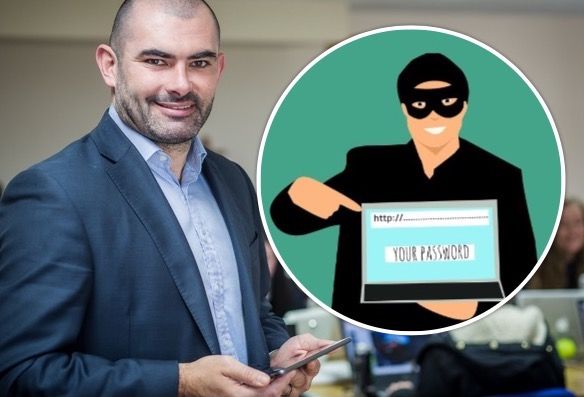

Christmas might be the time of giving, but this year’s saw £217,000 stolen from islanders’ accounts in a spate of banking fraud scams. But could this have been avoided?
According to teacher Rory Steel, it definitely could – and there’s no excuse for islanders not to arm themselves for the information needed to stash their cash safely away from fraudsters.
Otherwise, as the Express columnist argues, they’ll only have themselves to blame if something goes wrong…
“When the Christmas scams hit, Chief Inspector Chris Beechey, Chairman of the Jersey Fraud Prevention Forum (JFPF) said, "Living in Jersey we can too easily be overly trusting." Who’s to blame for that? Is it even a bad trait?

Pictured: Islanders lost £217,000 over the Christmas period.
Many of those who fall victim to these crimes blame themselves, while others have little sympathy, branding them as gullible… Why?
It appears to be part of the digital divide: the gulf between those that use technology with ease daily, and those that don’t know why people talk about ‘cookies’ and ‘spam’ outside of the kitchen. Then again, we can’t assume using and understanding are the same thing – that is why criminals are so successful.
The biggest misconception I hear is that students are ‘digital natives’ and know everything about computers. You don’t learn about technology by being near it, so using it only provides a superficial understanding. Millennials and Gen Y might navigate social media with ease, but not with particular care or caution. Growing up with technology doesn’t make you immune to its pitfalls.

Pictured: A scam that hit Rory's email inbox recently.
Fortunately, young people have teachers to guide them through the myriad of scams, manipulation and just plain inappropriate parts of the internet. Who does this for the generation who didn’t study ICT at school? Whose responsibility is it to educate the population and help the economy by keeping that £217k in the island for Christmas shopping? JFPF took immediate steps by taking to town straight after the Christmas scams, but education takes time.
I believe that we have to take collective responsibility, helping people by sharing our experiences regularly. I’m often messaged by friends, colleagues and my mother (she won’t thank me for saying) to gauge the authenticity of an email or text. I hope they pass on this knowledge to their own circles. You probably already know it’s a scam, but validating your suspicion helps you become more aware and helps your confidence. Being afraid to ask is the first step to ignorance – and ignorance of these issues is not bliss.
Many intelligent people send me messages of doubt – both creative methods of manipulation, and some tried and tested scams as old as the internet itself. Clearly educating our community on different scams is not hitting home or taking too long. With scams always evolving, we need to up our game.

Pictured: Rory says that islanders shouldn't be afraid to ask for guidance on potential scams.
So let’s get the conversation started – here are a few I see still running amok:
Apple do not send password change texts! Ignore! I would not trust a company that did. Don’t ring numbers back from texts sent by supposed banks or other agencies, they are likely premium pay numbers.
Phishing - tricking you into giving over personal details - is spelt with a “Ph” because early hackers were known as Phreaks. Unfortunately, the easy-to-spot dangers of a Nigerian prince kindly offering you large sums of money to help them out (once you’ve sent a few “minor details”) has largely passed.
These days, job offers, bank requests, tax rebates, PayPal requests and lottery wins should also be massive red flags. Nothing is ever free – so don’t trust it, and don’t reply directly. Many email addresses can be faked, and the ‘helpful’ information that your account has been hacked or about ‘suspicious’ transactions isn’t always so helpful. NEVER click the link. If you are worried, simply open a new tab, log into your account and check. Maybe even change your password – it’s good to do so now and then anyway.
Simply never give any personal details over the phone. If a bank, store or even the Police ring you and start asking questions about personal details, stop, and say you will return the call after finding the official number online or in the phonebook. If they try to give you a number to call, don’t trust it. They shouldn’t mind, your bank and the police want you to be safe. If they do, it’s another alarm bell.
Be aware of any local sellers paying with a cheque, especially if they ‘accidentally’ write one for more than requested and ask for the cash difference. The cheque is likely not going to cash. Also, meet in public places or at least not on your own.
Don’t believe ANY story on the internet, do a few Google searches to corroborate.
Comments
Comments on this story express the views of the commentator only, not Bailiwick Publishing. We are unable to guarantee the accuracy of any of those comments.